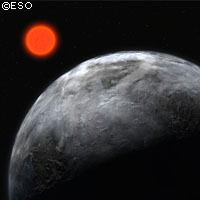Astronomers find new, habitable planet
European astronomers have discovered the most Earth-like planet outside of our Solar System yet. The planet is 50% larger than the Earth, and has the right conditions for liquid water. The exoplanet (so named because it orbits a star other than the Sun), is 14 times closer to its star than the Earth is to the Sun. However, the host star, the red dwarf Gliese 581 is smaller and cooler than the Sun, meaning that the planet lies in a habitable zone - the region around a star where water could be liquid. 'We have estimated that the mean temperature for this super-Earth lies between 0 and 40 degrees Celsius, and water would thus be liquid,' says Stéphane Udry from the Geneva Observatory in Switzerland. 'Moreover, its radius should be only 1.5 times the Earth's radius, and models predict that the planet should be either rocky - like our Earth - or fully covered with oceans,' he says. The planet was found by a team of Swiss, French and Portuguese scientists using the High Accuracy Radial Velocity for Planetary Searcher (HARPS) instrument. A spectrograph that is perhaps the most precise in the world. It is located on the European Southern Observatory's 3.6 metre telescope in Chile, and is able to measure velocities with a precision of more than one metre per second. 'HARPS is a unique planet hunting machine,' says Michel Mayor from the Geneva Observatory, and HARPS' principal investigator. 'Given the incredible precision of HARPS, we have focused our effort on low-mass planets. And we can say without doubt that HARPS has been very successful: out of the 13 known planets with a mass below 20 Earth masses, 11 were discovered with HARPS.' The scientists involved in the discovery are confident that the planet will be the subject of much future research. 'Because of its temperature and relative proximity, this planet will most probably be a very important target of the future space missions dedicated to the search for extra-terrestrial life,' says Xavier Delfosse of Grenoble University in France. 'On the treasure map of the Universe, one would be tempted to mark this planet with an X.'
Countries
Switzerland, France, Portugal



